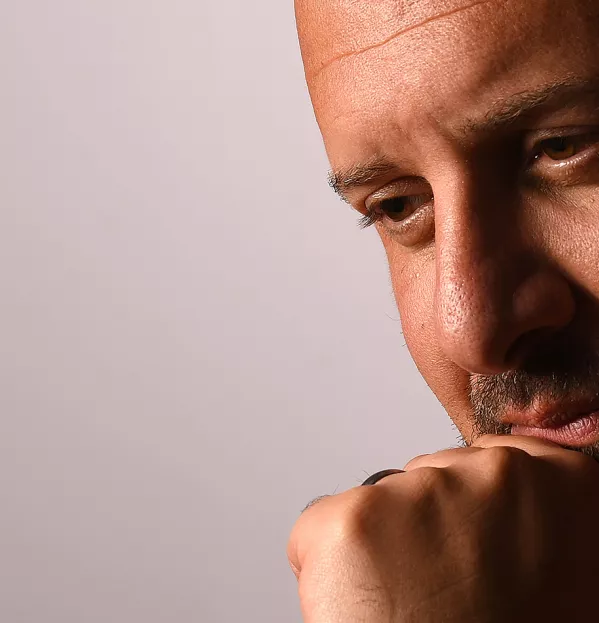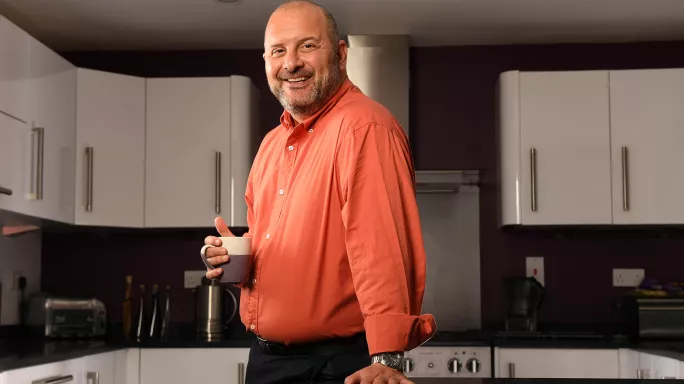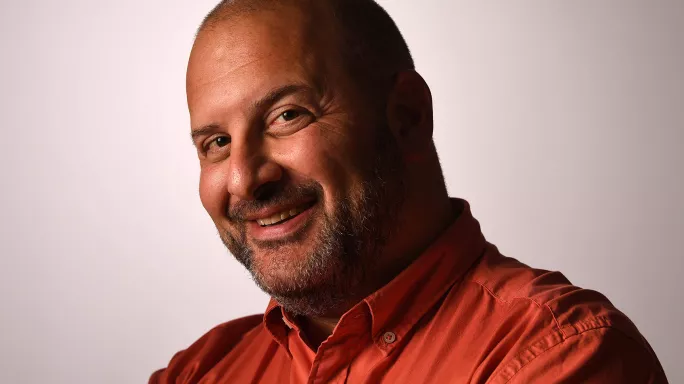- Home
- Leadership
- Strategy
- 10 questions with... Richard Gerver
10 questions with... Richard Gerver

Richard Gerver is president of the School Library Association, a role he has held since December 2020.
Prior to this, he worked as a teacher and headteacher, most notably turning the failing Grange Primary School, in Long Eaton in Nottinghamshire, into one of the highest achieving schools in the country - work that saw him awarded School Headteacher of the Year in 2005. He was also mentored by Sir Ken Robinson.
He spoke to Tes for our 10 questions with... series to discuss his own time in education - including the teacher that left a lasting impression on his life - the romantic reasons he became a teacher and why he thinks education must become more collaborative to unleash its full potential.
1. Who was your most memorable teacher at school?
I had a teacher called David Drew Smythe, who taught when I was about 8 or 9, and it was during the time my parents were going through a difficult divorce and it led to me showing real signs of anxiety…I developed a mild stammer and was just generally a bit of a mess.
David was passionate about drama and it sounds almost counterintuitive, but he said to me, “I really think you ought to get involved in our play”. His thinking was if I spoke somebody else’s lines, I would be free from having to worry about being me.
I think he believed inside there was a kid, a really positive kid, who just needed pulling back out. And he was absolutely right.
2. Did you ever get to tell him about the impact he had on you?
He moved to Australia a few years later to teach and a while back I was going out to Australia for some work and I reconnected with him. I said I’d love to meet up and thank him, because my career since standing on stages as a keynote speaker…if it hadn’t been for him, none of that would have happened.
So we arranged to meet but when I was sitting at the airport in London I got a message from his daughter saying, “I’m really sorry, but Dad died from a severe stroke two days ago.”
So one of my greatest regrets is I never got the chance to say thank you. But what did happen as a saving grace was I got to connect with his daughter and his wife, and have kept in touch with them ever since.
3. What were the best and worst things about your time at school?
The worst was definitely that I was in a very high-performing academic school. While I didn’t struggle academically, I wasn’t academic. It just wasn’t how I was built and designed.
I was very artsy. I loved art itself, I loved drama, I loved music. But because the school wasn’t geared up for those things, they were very much incidental adds-ons.
And from about 14 or 15, when real self-awareness starts to click in, I felt like a square peg in a round hole and, as a result, I came out of school at 18 feeling completely alienated because I was almost made to feel that my interests, passions, skills and talents were just not right.
The most positive thing… I had access to the most extraordinary experiences - whether it was sports facilities, low class numbers in a classroom, getting to go to the Barbican and see great theatre, or music at the Royal Albert Hall - it was just a huge amount of opportunity.
4. Why do you work in education?
When I left school, university seemed like an anathema to me so I signed up to be an actor. I remember my mother’s reaction was, “Oh, Christ”, because it was just before my A levels so the timing couldn’t have been worse. But I did get my A levels - just!
Anyway, I realised soon after that I was rubbish at acting and so started working doing all sorts of bits and pieces - selling advertising, writing copy, working as an estate agent and so on.
Eventually, I went back to university by getting a place on a really interesting modular degree on various arts subjects. Then towards the end of my first year, I met a girl that I really fell for.
I was in the students’ union one night trying everything in my repertoire and she said to me, “Well, I’m doing a teaching degree” and I said, “Oh teaching, what an amazing privilege”…just as part of my efforts to try and get a date!
Fast forward and we were together when I finished my degree and she said: “I’ve signed you up for the postgrad [for teaching] because I remembered what you said all those years ago.”
By that time I’d been into her school and done some work with her kids and loved it. I remember standing in her classroom and doing some drama with her kids and it was an epiphany… “Why have I never realised this actually is where the talents and passions I have should be?”
We’re about to celebrate our 30th wedding anniversary, too, so it all worked out!
5. What are you proudest of in your career? And what do you regret?
I think both sides of my headship [at Grange] cover that.
On the positive, when I took over, I realised very quickly there was a community that had a really special bond, despite this school failing and struggling - the staff loved the kids, the kids loved the staff, and a lot of the staff were connected to the community.
And because the school had nothing to lose, we did some pretty off the scale stuff. We innovated to a level that I’m not sure in a standard local authority school today you’d be allowed to do. As a result, within 18 months, our academic results went from the bottom 5 per cent to the top 5 per cent, and we went on to be recognised by UNESCO and at the National Education Awards.
But what really mattered was the kids in the community had a school they were walking into every day with their chests puffed out, they felt really proud, there was real achievement on every level.
I think on the regrets side, I stepped away from the school too soon.
I’d been there for eight years and I felt there was a risk I was going to keep pushing the boundaries just because, rather than for a benefit.
So I gave the school an open-ended leave date so they could find the right person but the person they did appoint didn’t work out, and it meant the school lurched down for a period - but is back to where it should be now.
I think I believed too much in the success we’d had that it was so transformed it would continue as normal with the culture we already had created. So I walked away perhaps too soon and I regret I left the community at a time when I had more work to do.

6. What would you say are the best and worst aspects of our school system today?
It makes me very sad that over the last decade or so we have become increasingly polarised in education.
I think we were getting to a point about a decade back where there was some really good constructive dialogue and professional conversations between policymakers, educators and the wider community. I’m not saying we got it right but there was a mature conversation.
Now, though, it’s all become a really polarised debate.
It’s either “you’re in my camp or you’re not”, skills versus knowledge, this camp on behaviour, that camp on behaviour, the tribe that sits around the government, and the tribe that sits opposed to the government…we need to stop that because the people who suffer are children.
On the best…I think over the time I was in education we have seen the professional understanding of child development, of how the brain works, of cognition, and so on, grow to a level far ahead of where it was in the late 80s.
So I think we have a hugely professional body of people, and that has profoundly changed education, and I think education can far more rightly now stand up and call itself a profession, because of the level of skill and knowledge of professional educators.
7. Who in education has influenced you the most?
Well, there are three. David [Drew Smythe] I’ve mentioned because of what he taught me about empathy.
The second is a woman I met a number of years ago in Pakistan called Mrs Kasuri, who set up a school system in Pakistan because she felt that the existing school system there was really divisive and troubled and she wanted to offer education equality with boys and girls educated equally.
As you can imagine, she has faced real contention during her career and had death threats, assassination attempts and so on, but she refuses to veer away from that. So for courage, Ms Kasuri is unbelievable.
But the most profound impact on me was my friend and mentor, Sir Ken Robinson.
This was before he became a superstar after his TED Talk. He took me under his wing and was an incredible support and guide to me when I was a headteacher.
People portray him as somehow being soft and fluffy but he wasn’t…he was a real critical friend and supporter and, right the way through my career, he encouraged me, challenged me and developed me.
I was hugely fortunate because I think if I met him once he’d become this kind of global phenomenon, he would never have had the time to get to know me or be my mentor and friend but his impact was profound.

8. What would you do if you became education secretary tomorrow?
The first thing I would do is to reimagine what we mean by research informed. Research is vital and we need it for the integrity of the future of education - but unfortunately, I think too much of what they label as research is just sifting through research to find evidence their ideology works.
I want to see a government that has the confidence to truly research and challenge its own opinions, ideology and beliefs.
I would also put a much broader church of people around me to advise and support me so we created a much clearer and much more dynamic narrative for what the future of education needs to be.
9. What do you think schools will be like in 30 years?
I think they’re going to be radically different for a number of reasons.
One is digital technology, which is going to increase the reach of what we can do as educators by allowing us to engage with people around the world and bring them into the classroom remotely, as we saw happen during Covid. I think there’s a really expansive opportunity for digital technology there.
I think we’re also seeing an explosion globally, and partly accelerated by Covid, in homeschooling as we’re seeing a generation of new young parents who are saying, “I don’t want the status quo for my kid, I want something different.”
So I think we are going to be forced globally to rethink some of what that education system looks like because of those two forces.
10. What are the most important lessons you’ve learned from doing this job?
Listening. I think listening is so incredibly important. The problem is when you’re in a hierarchically powerful position, whether a teacher in a classroom, a school leader, a leader of an organisation, or a political system, is that you feel under profound pressure to have the answers to everything.
But I think sometimes we don’t realise that actually, our job isn’t to have all the answers but to listen and find solutions from those that do have the answers. That takes the pressure off and opens up the power of collaboration that leads to better outcomes.
Linked to that is objectivity. We’ve got to be confident enough to lay our own egos at the door and be the first people to challenge our own perception of what we believe works and what doesn’t, what’s right and what’s wrong.
Richard Gerver was talking to Dan Worth
You need a Tes subscription to read this article
Subscribe now to read this article and get other subscriber-only content:
- Unlimited access to all Tes magazine content
- Exclusive subscriber-only stories
- Award-winning email newsletters
Already a subscriber? Log in
You need a subscription to read this article
Subscribe now to read this article and get other subscriber-only content, including:
- Unlimited access to all Tes magazine content
- Exclusive subscriber-only stories
- Award-winning email newsletters
topics in this article



